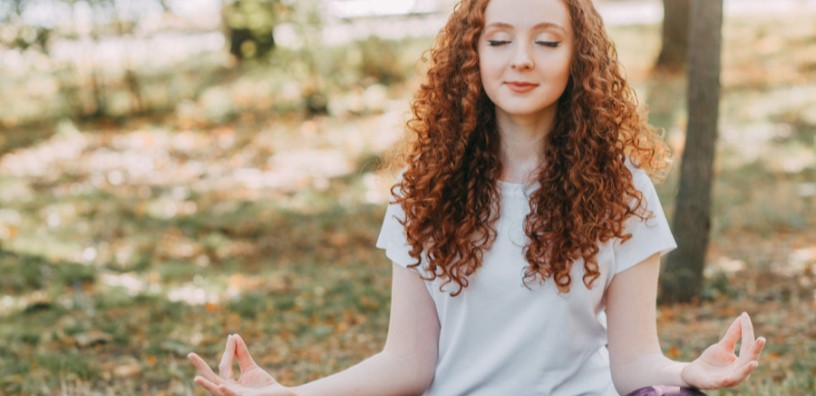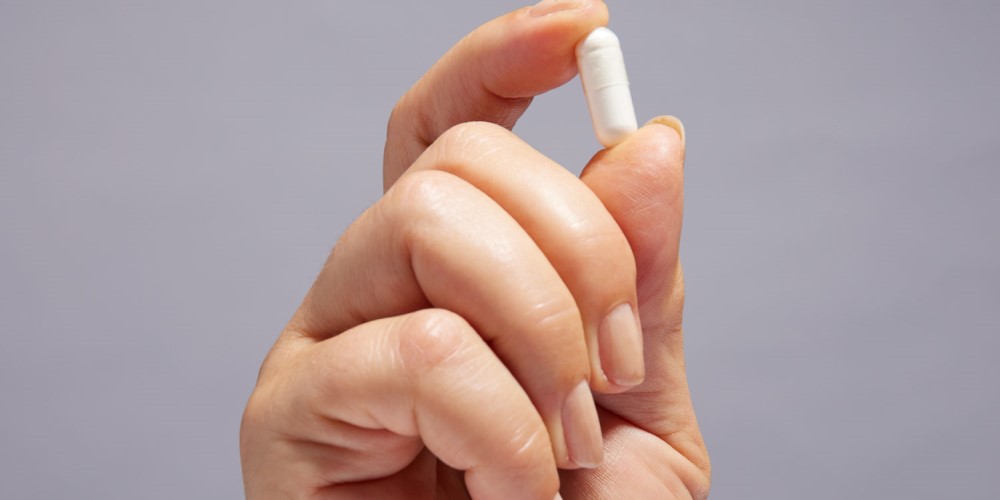
The Gut-Brain Axis: What Is It?
There is a link between your gut health and mental health—it’s science!
Your gut and brain are close buddies, and the gut-brain axis is the communication system between the two. Studies have shown that your gut can affect your brain and vice versa.[6,7,8]
More neurotransmitters, which are the chemical signals that send messages throughout your body, are produced in your gut than in your brain. An imbalance in your gut microbiome (like more ‘bad’ bacteria than ‘good’ ones) means there might also be an imbalance in your mental health (you feel more tired, anxious, overwhelmed, etc.).[6,7,8]
So, what can you do to balance your gut to in turn balance your mental well-being?
Let’s take a look.

Take More Time for You!
Get Enough Sleep
Lack of sleep can put your gut and your brain out of balance.[1] It’s crucial for your gut-brain axis to get enough sleep each night.
For better sleep, you can try:
- Bright Lights During the Day - Open the blinds when you’re stuck in the house. Invest in artificial bright lights to keep the house well-lit. Bright light during the daytime can promote healthy circadian rhythms, energy throughout the day, and longer, higher-quality sleep at night.[3,4]
- Cooler Temperatures - When it is too warm, you may have noticed it is much more difficult to fall asleep and stay asleep. A study found that temperatures in the bedroom can affect sleep more than noise.[5] Experts say around 65 degrees Fahrenheit is the best bedroom temperature for optimum sleep.[10]
- Night Time Complex - Our Night Time Complex contains a super blend of natural ingredients, including 5-HTP, Montmorency Cherry, Hops Extract, Lemon Balm, Magnesium, B vitamins, Folic Acid, Zinc, Chamomile Extract, and California Poppy Extract. Our unique formula delivers potent doses of clinically studied ingredients that are proven to promote more restful sleep and calmness.
Maintain Stress Levels
We all get stressed and anxious. It’s normal! But, unhealthy levels of stress can affect your gut health AND your mental health in devastating ways.[2]
To ease those everyday stressors, you can try:
- Unwinding - Relax and take a breather! A hot bath filled with salts or essential oils to soothe your mind and body might be just the thing, or maybe you need to go on a long run to blow off some steam. Whatever your preferred coping mechanism is, make sure you are taking care of yourself in healthy ways.
- Letting it Out - Release that pent-up stress. It’s okay to have a good cry sometimes, and research actually recommends it.[11] Let it all out, friend.
- Cutting Down - Caffeine and sugar are natural stimulants, so it may be best to cut down occasionally. Research shows that high levels of caffeine and sugar not only increase those nervous jitters but can decrease the production of serotonin, too.[12]
- Ashwagandha Complex - Our maximum strength Ashwagandha Complex contains 100% natural and highly absorbable KSM-66 Ashwagandha, essential B Vitamins, Rhodiola Rosea, L-Theanine, and Passion Flower. Ashwagandha has been shown to help reduce fatigue, encourage sleep, boost energy levels, and improve mood naturally.
- Cognitive Complex - Our Cognitive Complex combines 16 ingredients to support optimal cognitive functioning, including Vitamin E, Vitamin B6, Pantothenic Acid, Iron, Zinc, Iodine, Ginkgo Biloba Extract, Lion’s Mane Extract, Bacopa Monnieri Extract, Guarana Seed, Docosahexaenoic Acid, L-Theanine, Lutein, CoEnzyme Q10, Phosphatidylserine, and Zeaxanthin. Our ingredients have been studied and proven to promote normal psychological function, support memory, and concentration, improve mental performance, and more.

Resources:
- Brittany A. Matenchuk, Piush J. Mandhane, Anita L. Kozyrskyj, Sleep, circadian rhythm, and gut microbiota, Sleep Medicine Reviews, Volume 53, 2020, 101340, ISSN 1087-0792, https://doi.org/10.1016/j.smrv.2020.101340.
- American Psychological Association. (2018, November 1). Stress effects on the body. https://www.apa.org/topics/stress/body.
- Tuunainen, A., Kripke, D. F., & Endo, T. (2004). Light therapy for non-seasonal depression. The Cochrane database of systematic reviews, 2004(2), CD004050. https://doi.org/10.1002/14651858.CD004050.pub2.
- Viola, A. U., James, L. M., Schlangen, L. J., & Dijk, D. J. (2008). Blue-enriched white light in the workplace improves self-reported alertness, performance and sleep quality. Scandinavian journal of work, environment & health, 34(4), 297–306. https://doi.org/10.5271/sjweh.1268
- Libert, J. P., Bach, V., Johnson, L. C., Ehrhart, J., Wittersheim, G., & Keller, D. (1991). Relative and combined effects of heat and noise exposure on sleep in humans. Sleep, 14(1), 24–31. https://doi.org/10.1093/sleep/14.1.24
- Yano, J. M., Yu, K., Donaldson, G. P., Shastri, G. G., Ann, P., Ma, L., Nagler, C. R., Ismagilov, R. F., Mazmanian, S. K., & Hsiao, E. Y. (2015). Indigenous bacteria from the gut microbiota regulate host serotonin biosynthesis. Cell, 161(2), 264–276. https://doi.org/10.1016/j.cell.2015.02.047
- Cryan, J. F., & Dinan, T. G. (2012). Mind-altering microorganisms: the impact of the gut microbiota on brain and behaviour. Nature reviews. Neuroscience, 13(10), 701–712. https://doi.org/10.1038/nrn3346
- Mayer, E. A., Tillisch, K., & Gupta, A. (2015). Gut/brain axis and the microbiota. The Journal of clinical investigation, 125(3), 926–938. https://doi.org/10.1172/JCI76304
- Carabotti, M., Scirocco, A., Maselli, M. A., & Severi, C. (2015). The gut-brain axis: interactions between enteric microbiota, central and enteric nervous systems. Annals of gastroenterology, 28(2), 203–209. https://www.ncbi.nlm.nih.gov/pmc/articles/PMC4367209/
- The best temperature for sleep: Advice & tips. Sleep Foundation. (2022, March 11). Retrieved from https://www.sleepfoundation.org/bedroom-environment/best-temperature-for-sleep#:~:text=The%20best%20bedroom%20temperature%20for,for%20the%20most%20comfortable%20sleep.
- Gračanin, A., Vingerhoets, A.J.J.M., Kardum, I. et al. Why crying does and sometimes does not seem to alleviate mood: a quasi-experimental study. Motiv Emot 39, 953–960 (2015). https://doi.org/10.1007/s11031-015-9507-9.
- Lindberg, S. (2020, June 23). Your anxiety loves sugar; eat these 3 things instead. Healthline. Retrieved from https://www.healthline.com/health/mental-health/how-sugar-harms-mental-health.
